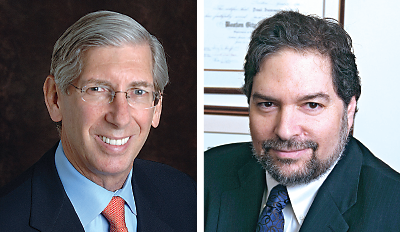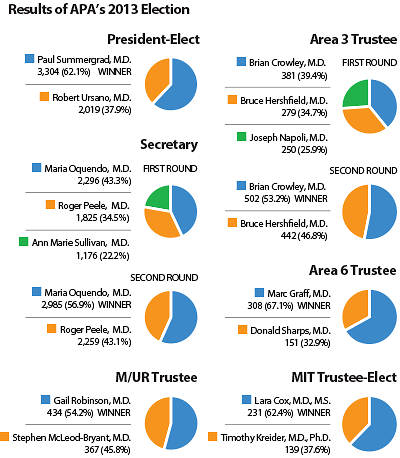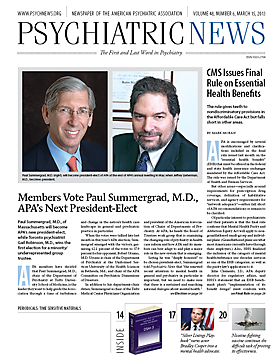APA members have decided that Paul Summergrad, M.D., chair of the Department of Psychiatry at Tufts University School of Medicine, is the leader they want to help guide the Association through a time of turbulence and change in the nation’s health care landscape in general and psychiatric practice in particular.
When the votes were tallied late last month in this year’s APA election, Summergrad emerged with the victory, garnering 62.1 percent of the votes to 37.9 percent for his opponent, Robert Ursano, M.D. Ursano is chair of the Department of Psychiatry at the Uniformed Services University of the Health Sciences in Bethesda, Md., and chair of the APA Committee on Psychiatric Dimensions of Disasters.
In addition to his department-chair duties, Summergrad is chair of the Tufts Medical Center Physicians Organization and president of the American Association of Chairs of Departments of Psychiatry. At APA, he heads the Board of Trustees work group that is examining the changing role of psychiatry in health care reform and how APA and its members can best adapt to and play a major role in the new system that is emerging.
Saying he was “deeply honored” to be chosen president-elect, Summergrad told Psychiatric News that “the renewed recent attention tomental health in general and psychiatry in particular is important, but we need to make sure that there is a sustained and searching national dialogue about mental health.”
“During this period of significant transformation in our health care system, APA must be the most effective voice it can for our patients, our members, and the field as a whole,” he emphasized. “To achieve this end, we will need to address the following issues: How do we advocate effectively for our patients and psychiatry at both national and state levels? How can we make sure that APA, our state associations, and district branches have the resources they need to both support our members and engage in advocacy? How can we make APA membership a valued and professionally sustaining endeavor? And lastly, how do we improve communication both internally and externally about the work we do as physicians, the nature of the disorders for which we provide care, as well as our scientific, educational, and publishing missions including the new DSM-5?”
In addressing these issues, Summergrad said, “we must continue careful short- and long-term strategic planning, make sure our governance supports our missions, and work on multifaceted approaches to better communication with our membership, policymakers, and the public.”
In the race for APA secretary, New York psychiatrist Maria Oquendo, M.D., outpolled fellow New Yorker Ann Marie Sullivan, M.D., and current secretary Roger Peele, M.D. Because this was a three-way race, APA’s preferential voting system was used to determine the winner, since no one earned a majority in the first round of balloting. Since Sullivan came in third, her votes were distributed between Oquendo and Peele, depending on the number of Sullivan voters who indicated that one of these two candidates was their second or third choice. Oquendo then ended up with 56.9 percent of the votes. She is residency training director at the New York State Psychiatric Institute and Columbia University.
This year’s election marked the first in which members who belonged to one of APA’s seven minority/underrepresented group (M/UR) caucuses voted for candidates for the Board’s new minority/underrepresented group (M/UR) trustee position.
In that race, Toronto psychiatrist Gail Robinson, M.D., outpolled Stephen McLeod-Bryant, M.D., by 54.2 percent to 45.8 percent. Robinson is the Women’s Caucus representative to the APA Assembly, a professor of psychiatry at the University of Toronto, and director of the Women’s Mental Health Program of the University Health Network in Toronto. McLeod-Bryant, an associate professor at the Medical University of South Carolina, is the Assembly representative for the Caucus of Black Psychiatrists.
Two of APA’s seven Area trustee seats were up for election this year. In Area 3, incumbent Brian Crowley, M.D., of Washington, D.C., was the victor in another three-way contest. His opponents were Bruce Hershfield, M.D., of Maryland and Joseph Napoli, M.D., of New Jersey. Napoli came in third, and after his votes were distributed, Crowley ended up with 53.2 percent of the ballots compared with 46.8 percent for Hershfield.
In Area 6, which includes all of the California district branches, Marc Graff, M.D., won a second term on the Board, besting Donald Sharps, M.D., by 67.1 percent to 32.9 percent.
Each year the Association’s resident members elect a member-in-training trustee-elect (MITTE), who the following year takes over as member-in-training trustee. Lara Cox, M.D., M.S., a resident at New York University, won this year’s MITTE race, with 62.4 percent of the vote, to 37.6 percent for her opponent, Timothy Kreider, M.D., Ph.D., a resident at the University of Pennsylvania.
All of the winning candidates assume their positions on the Board of Trustees at the close of the annual meeting in May. ■


